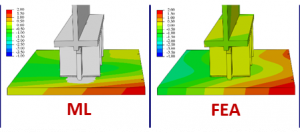Digital twin solutions through the integration of 3D digital imaging, engineering simulation, and machine learning cognition.
Artificial intelligence (AI) and smart systems are now pervasive. The journey of digitization and smart technologies can take many forms for different applications. For engineering services, the journey starts with creating a digital replica of the physical world that mirrors the actual asset as closely as possible and tracks the degradation of physical assets over time. Applus+ in Australia is developing new services based on photogrammetry techniques for the high-quality digitization of assets. The digital replica allows viewing scanned assets via a web browser, a standard desktop, or even a virtual reality environment.

Using photogrammetry techniques for the digitization of assets
High-performance computing (HPC) enables smart engineering where a computer can wisely act without being explicitly programmed. A digital twin, which is a smart form of a digital replica, contains integrated engineering algorithms that lead to wise decisions and subsequent actions.

Machine learning for better data management
Applus+ in Canada is offering hybrid digital twins that combine simulation tools with machine learning algorithms for data-driven prediction. Applus+ uses a digitized representation of assets to run engineering simulations ranging from engineering critical assessment (ECA) to cognitive computing via machine learning tools.
This service becomes more attractive in situations where our engineers are dealing with complex processes or structures, but the computation time creates a bottleneck, hindering engineering decisions. Our team in Canada is applying machine learning to engineering in new ways, where a digital twin uses a relatively small dataset from computational simulations as its initial information set to practice predictive accuracy. The information is then extended to improve machine learning and achieve ever-higher accuracy. Future services include AI analytics, where machine learning enables AI to detect different types of corrosion, dropped objects, scaffolding, vegetation encroachment, etc.